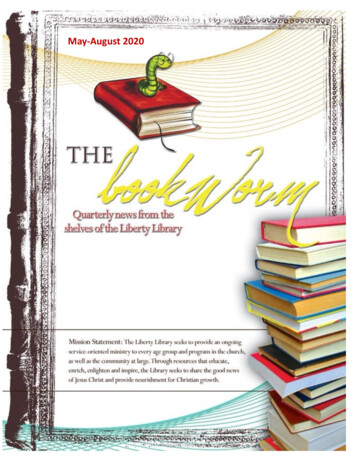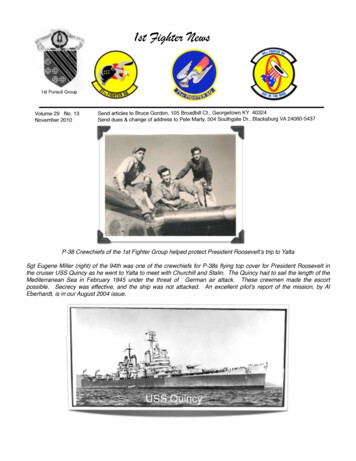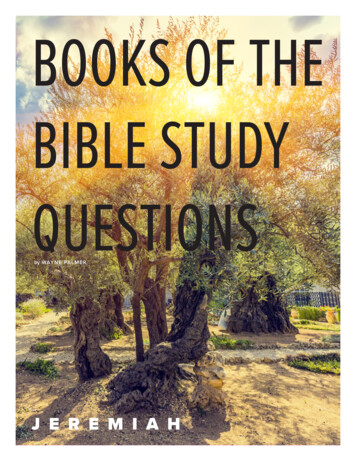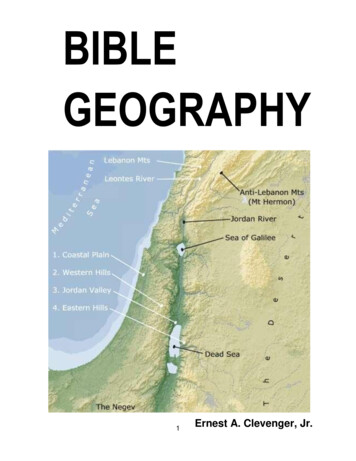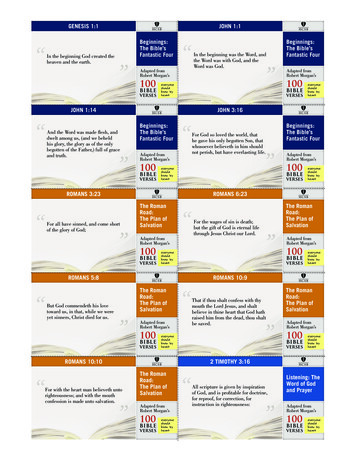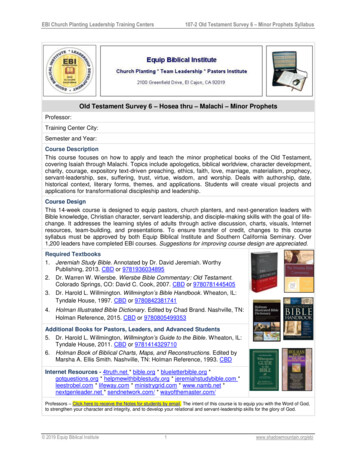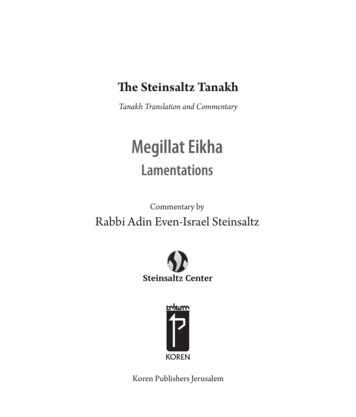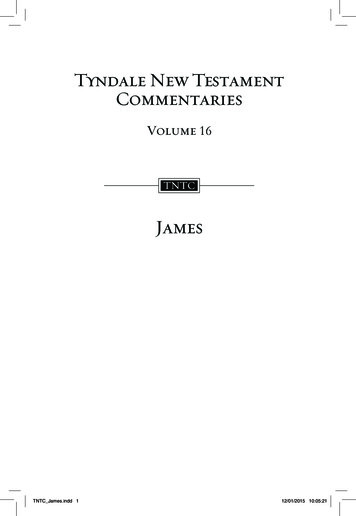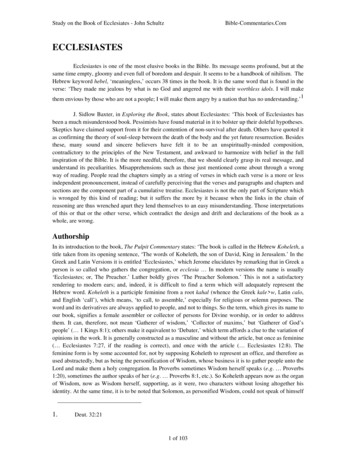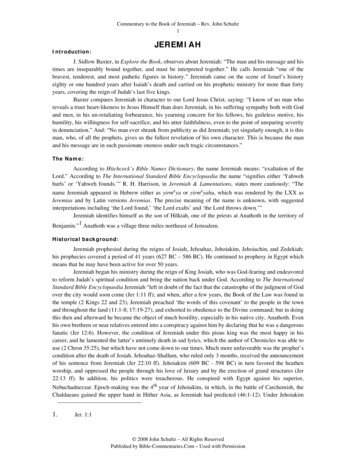
Transcription
Commentary to the Book of Jeremiah – Rev. John Schultz1JEREMIAHIntroduction:J. Sidlow Baxter, in Explore the Book, observes about Jeremiah: “The man and his message and histimes are inseparably bound together, and must be interpreted together.” He calls Jeremiah “one of thebravest, tenderest, and most pathetic figures in history.” Jeremiah came on the scene of Israel’s historyeighty or one hundred years after Isaiah’s death and carried on his prophetic ministry for more than fortyyears, covering the reign of Judah’s last five kings.Baxter compares Jeremiah in character to our Lord Jesus Christ, saying: “I know of no man whoreveals a truer heart-likeness to Jesus Himself than does Jeremiah, in his suffering sympathy both with Godand men, in his un-retaliating forbearance, his yearning concern for his fellows, his guileless motive, hishumility, his willingness for self-sacrifice, and his utter faithfulness, even to the point of unsparing severityin denunciation.” And: “No man ever shrank from publicity as did Jeremiah; yet singularly enough, it is thisman, who, of all the prophets, gives us the fullest revelation of his own character. This is because the manand his message are in such passionate oneness under such tragic circumstances.”The Name:According to Hitchcock’s Bible Names Dictionary, the name Jeremiah means: “exaltation of theLord.” According to The International Standard Bible Encyclopaedia the name “signifies either ‘Yahwehhurls’ or ‘Yahweh founds.’” R. H. Harrison, in Jeremiah & Lamentations, states more cautiously: “Thename Jeremiah appeared in Hebrew either as yirmeya or yirmeyahu, which was rendered by the LXX asIeremias and by Latin versions Jeremias. The precise meaning of the name is unknown, with suggestedinterpretations including ‘the Lord found,’ ‘the Lord exalts’ and ‘the Lord throws down.’”Jeremiah identifies himself as the son of Hilkiah, one of the priests at Anathoth in the territory ofBenjamin.”1 Anathoth was a village three miles northeast of Jerusalem.Historical background:Jeremiah prophesied during the reigns of Josiah, Jehoahaz, Jehoiakim, Jehoiachin, and Zedekiah;his prophecies covered a period of 41 years (627 BC – 586 BC). He continued to prophesy in Egypt whichmeans that he may have been active for over 50 years.Jeremiah began his ministry during the reign of King Josiah, who was God-fearing and endeavoredto reform Judah’s spiritual condition and bring the nation back under God. According to The InternationalStandard Bible Encyclopaedia Jeremiah “left in doubt of the fact that the catastrophe of the judgment of Godover the city would soon come (Jer 1:11 ff); and when, after a few years, the Book of the Law was found inthe temple (2 Kings 22 and 23), Jeremiah preached ‘the words of this covenant’ to the people in the townand throughout the land (11:1-8; 17:19-27), and exhorted to obedience to the Divine command; but in doingthis then and afterward he became the object of much hostility, especially in his native city, Anathoth. Evenhis own brethren or near relatives entered into a conspiracy against him by declaring that he was a dangerousfanatic (Jer 12:6). However, the condition of Jeremiah under this pious king was the most happy in hiscareer, and he lamented the latter’s untimely death in sad lyrics, which the author of Chronicles was able touse (2 Chron 35:25), but which have not come down to our times. Much more unfavorable was the prophet’scondition after the death of Josiah. Jehoahaz-Shallum, who ruled only 3 months, received the announcementof his sentence from Jeremiah (Jer 22:10 ff). Jehoiakim (609 BC - 598 BC) in turn favored the heathenworship, and oppressed the people through his love of luxury and by the erection of grand structures (Jer22:13 ff). In addition, his politics were treacherous. He conspired with Egypt against his superior,Nebuchadnezzar. Epoch-making was the 4th year of Jehoiakim, in which, in the battle of Carchemish, theChaldaeans gained the upper hand in Hither Asia, as Jeremiah had predicted (46:1-12). Under Jehoiakim1.Jer. 1:1 2008 John Schultz – All Rights ReservedPublished by Bible-Commentaries.Com – Used with Permission
Commentary to the Book of Jeremiah – Rev. John Schultz2Jeremiah delivered his great temple discourse (7-9; 10:17-25). The priests for this reason determined to havethe prophet put to death (chapter 26). However, influential elders interceded for him, and the princes yetshowed some justice. He was, however, abused by the authorities at the appeal of the priests (chapter 20).According to 36:1 ff, he was no longer permitted to enter the place of the temple. For this reason the Lordcommanded him to collect his prophecies in a book roll, and to have them read to the people by his faithfulpupil Baruch (chapter 36; compare chapter 45). The book fell into the hands of the king, who burned it.However, Jeremiah dictated the book a second time to Baruch, together with new additions. Jehoiachin orConiah (Jer 22:24 ff), the son of Jehoiakim, after a reign of 3 months, was taken into captivity to Babylon byNebuchadnezzar, together with a large number of his nobles and the best part of the people (Jer 24:1; 29:2),as the prophet had predicted (22:20-30). But conditions did not improve under Zedekiah (597 BC - 586 BC).This king was indeed not as hostile to Jeremiah as Jehoiakim had been; but all the more hostile were theprinces and the generals, who were now in command after the better class of these had been deported toBabylon. They continually planned rebellion against Babylon, while Jeremiah was compelled to oppose andput to naught every patriotic agitation of this kind. Finally, the Babylonian army came in order to punish thefaithless vassal who had again entered into an alliance with Egypt. Jeremiah earnestly advised submission,but the king was too weak and too cowardly as against his nobles. A long siege resulted, which caused thedirest sufferings in the life of Jeremiah. The commanders threw him into a vile prison, charging him withbeing a traitor (37:11 ff). The king, who consulted him secretly, released him from prison, and put him intothe ‘court of the guard’ (37:17 ff), where he could move around freely, and could again prophesy. Now thatthe judgment had come, he could again speak of the hopeful future (chapters 32, 33). Also chapters 30 and31, probably, were spoken about this time. But as he continued to preach submission to the people, those inauthority cast him into a slimy cistern, from which the pity of a courtier, Ebed-melech, delivered him(39:15-18). He again returned to the court of the guard, where he remained until Jerusalem was taken. Afterthe capture of the city, Jeremiah was treated with great consideration by the Babylonians, who knew that hehad spoken in favor of their government (Jer 39:11 ff; 40:1 ff). They gave him the choice of going toBabylon or of remaining in his native land. He decided for the latter, and went to the governor Gedaliah, atMizpah, a man worthy of all confidence. But when this man, after a short time, was murdered byconscienceless opponents, the Jews who had been left in Palestine, becoming alarmed and fearing thevengeance of the Chaldaeans, determined to immigrate to Egypt. Jeremiah advised against this mostearnestly, and threatened the vengeance of Yahweh, if the people should insist upon their undertaking (42:1ff). But they insisted and even compelled the aged prophet to go with them (43:1 ff). Their first goal wasTahpanhes (Daphne), a town in Lower Egypt. At this place he still continued to preach the word of God tohis fellow-Israelites; compare the latest of his preserved discourses in 43:8-13, as also the sermon in chapter44, delivered at a somewhat later time but yet before 570 BC. At that time Jeremiah must have been from 70to 80 years old. He probably died soon after this in Egypt.”R. K. Harrison, in Jeremiah & Lamentations, dates Jeremiah’s oracles against the followinghistorical background:a. Under Josiah1:1–9; 2:1 – 3:5; 3:6 – 6:30; 7:1 – 10:25; 18:1 – 20:18b. Under Jehoiakim11:1 – 13:14; 14:1 – 15:21; 16:1 – 17:27; 22:1– 30; 23:1– 8, 9– 40; 25:1– 14, 15–38; 26:1– 24; 35:1– 19; 36:1– 32; 45:1– 5; 46:1– 12; 13– 28; 47:1– 7; 48:1– 47c. Under Jehoiachin31:15–47d. Under Zedekiah21:1 – 22:30; 24:1–10; 27:1–22; 28:1–17; 29:1–32; 30:1 – 31:40; 32:1–44; 33:1–26; 34:1–7; 8–11; 12–22; 37:1–21; 38:1–28; 39:1–18; 49:1–22, 23–33, 34– 39;50:1 – 51:64e. Under Gedaliah40:1 – 42:22; 43:1 – 44:30f. Historical Appendix52:1–34 2008 John Schultz – All Rights ReservedPublished by Bible-Commentaries.Com – Used with Permission
Commentary to the Book of Jeremiah – Rev. John Schultz3Character of Jeremiah:The International Standard Bible Encyclopaedia states: “The Book of Jeremiah gives us not only afuller account of the life and career of its author than do the books of the other prophets, but we also learnmore about his own inner and personal life and feelings than we do of Isaiah or any other prophet. From thissource we learn that he was, by nature, gentle and tender in his feelings, and sympathetic. A decided contrastto this is found in the hard and unmerciful judgment which it was his mission to announce. God made himstrong and firm and immovable like iron for his mission (Jer 1:18; 15:20). This contrast between hisnaturally warm personal feelings and his strict Divine mission not rarely appears in the heart-utterancesfound in his prophecies. At first he rejoiced when God spoke to him (15:16); but soon these words of Godwere to his heart a source of pain and of suffering (15:17 ff). He would have preferred not to utter them; andthen they burned in his breast as a fire (20:7 ff; 23:9). He personally stood in need of love, and yet was notpermitted to marry (Jer 16:1 f). He was compelled to forego the pleasures of youth (15:17). He loved hispeople as nobody else, and yet was always compelled to prophesy evil for it, and seemed to be the enemy ofhis nation. This often caused him to despair. The enmity to which he fell a victim, on account of hisdeclaration of nothing but the truth, he deeply felt; see his complaints (9:1 ff; 12:5 ff; 15:10; 17:14-18;18:23, and often). In this sad antagonism between his heart and the commands of the Lord, he would perhapswish that God had not spoken to him; he even cursed the day of his birth (15:10; 20:14-18; compare Job 3:1ff). Such complaints are to be carefully distinguished from that which the Lord through His Spiritcommunicated to the prophet. God rebukes him for these complaints, and demands of him to repent and totrust and obey Him (Jer 15:19). This discipline makes him all the more unconquerable. Even his bitterdenunciations of his enemies (11:20 ff; 15:15; 17:18; 18:21-23) originated in part in his passionate and deepnature, and show how great is the difference between him and that perfect Sufferer, who prayed even for Hisdeadly enemies. But Jeremiah was nevertheless a type of that Suffering Savior, more than any of the OldTestament saints. He, as a priest, prayed for his people, until God forbade him to do so (7:16; 11:14; 14:11;18:20). He was compelled more than all the others to suffer through the anger of God, which was to afflicthis people. The people themselves also felt that he meant well to them. A proof of this is seen in the fact thatthe rebellious people, who always did the contrary of what he had commanded them, forced him, theunwelcome prophet of God, to go along with them, to Egypt, because they felt that he was their goodgenius.”Outline:From Jeremiah & Lamentations, by R. K. Harrison, we copy the following outline:A. PROPHECIES RELATING TO CURRENT HISTORY AND DOMESTIC MATTERS (1:1 – 45:5)I.II.III.IV.V.VI.VII.VIII.PROPHECIES OCCURRING BETWEEN 625 BC AND THE FOURTH YEAR OFJEHOIAKIM (1:1–20:18)UTTERANCES RELATING TO THE KINGS OF JUDAH AND FALSE PROPHETS (21:1 –25:14)A SUMMARY OF PROPHECIES AGAINST FOREIGN NATIONS (25:15–38)PREDICTIONS OF THE FALL OF JERUSALEM (26:1 – 28:17)LETTER TO THE DEPORTEES IN BABYLONIA (29:1–32)MESSAGES OF CONSOLATION (30:1 – 31:40)PROPHECIES FROM THE TIME OF ZEDEKIAN (32:1 – 44:30)A MESSAGE TO BARUCH (45:1–5)B. ORACLES AGAINST FOREIGN NATIONS (46:1–51:64)I.AGAINST EGYPT (46:1–28) 2008 John Schultz – All Rights ReservedPublished by Bible-Commentaries.Com – Used with Permission
Commentary to the Book of Jeremiah – Rev. John Schultz4II.III.IV.V.VI.VII.VIII.IX.AGAINST PHILISTIA (47:1–7)AGAINST MOAB (48:1–47)AGAINST AMMON (49:1–6)AGAINST EDOM (49:23–27)AGAINST DAMASCUS (49:28–33)AGAINST KEDAR AND HAZOR (49:34–39)AGAINST ELAM (49:34–39)AGAINST BABYLON (50:1 – 51:64)C. HISTORICAL APPENDIX (52:1–34)A. PROPHECIES RELATING TO CURRENT HISTORY ANDDOMESTIC MATTERS (1:1 – 45:5)I. PROPHECIES OCCURRING BETWEEN 625 BC AND THE FOURTH YEAR OFJEHOIAKIM (1:1–20:18)1. Jeremiah is called and commissioned1:1-191 The words of Jeremiah son of Hilkiah, one of the priests at Anathoth in the territory of Benjamin.2 The word of the LORD came to him in the thirteenth year of the reign of Josiah son of Amon king ofJudah,3 and through the reign of Jehoiakim son of Josiah king of Judah, down to the fifth month of theeleventh year of Zedekiah son of Josiah king of Judah, when the people of Jerusalem went into exile.4 The word of the LORD came to me, saying,5 “Before I formed you in the womb I knew you, before you were born I set you apart; I appointed you asa prophet to the nations.”6 “Ah, Sovereign LORD,” I said, “I do not know how to speak; I am only a child.”7 But the LORD said to me, “Do not say, ‘I am only a child.’ You must go to everyone I send you to andsay whatever I command you.8 Do not be afraid of them, for I am with you and will rescue you,” declares the LORD.9 Then the LORD reached out his hand and touched my mouth and said to me, “Now, I have put mywords in your mouth.10 See, today I appoint you over nations and kingdoms to uproot and tear down, to destroy and overthrow,to build and to plant.”11 The word of the LORD came to me: “What do you see, Jeremiah?” “I see the branch of an almondtree,” I replied.12 The LORD said to me, “You have seen correctly, for I am watching to see that my word is fulfilled.”13 The word of the LORD came to me again: “What do you see?” “I see a boiling pot, tilting away fromthe north,” I answered.14 The LORD said to me, “From the north disaster will be poured out on all who live in the land.15 I am about to summon all the peoples of the northern kingdoms,” declares the LORD. “Their kingswill come and set up their thrones in the entrance of the gates of Jerusalem; they will come against all hersurrounding walls and against all the towns of Judah.16 I will pronounce my judgments on my people because of their wickedness in forsaking me, in burningincense to other gods and in worshiping what their hands have made.17 “Get yourself ready! Stand up and say to them whatever I command you. Do not be terrified by them,or I will terrify you before them. 2008 John Schultz – All Rights ReservedPublished by Bible-Commentaries.Com – Used with Permission
Commentary to the Book of Jeremiah – Rev. John Schultz518 Today I have made you a fortified city, an iron pillar and a bronze wall to stand against the whole land— against the kings of Judah, its officials, its priests and the people of the land.19 They will fight against you but will not overcome you, for I am with you and will rescue you,” declaresthe LORD.In the introduction of this book, we find the same Hebrew word dabar used for “the words ofJeremiah” (v.1) and for “the word of the LORD.” The Hebrew dabar has a wider meaning than the English“word.” It also stands for “speech” as in the verse: “Now the whole world had one language and a commonspeech.” 1 It can indicate a cause, as in the verse: “But the LORD inflicted serious diseases on Pharaoh andhis household because of Abram’s wife Sarai.”2 And it is used for the Word of God, as in “After this, theword of the LORD came to Abram in a vision: ‘Do not be afraid, Abram. I am your shield, your very greatreward.’”3 This gives us liberty to interpret “the words of Jeremiah” as not only the things he said, but alsothe reason for his saying so and the circumstances into which these prophecies brought him.Being the son of Hilkiah from the town of Anathoth, one of the places assigned to the tribe of4Levi, makes Jeremiah a member of that tribe and of the priestly cast. The thirteenth year of the reign ofJosiah would date Jeremiah’s call to the prophetic ministry at approximately 627 BC.R. K. Harrison, in Jeremiah & Lamentations, remarks about v.1: “This verse describes the point atwhich the word of the Lord became a matter of great personal importance to Jeremiah. As a boy he may wellhave been familiar with the priestly practices, but in any case there is no evidence that he ever served as apriest. It is possible, however, that what he observed in the cultus as a young man influenced his attitudetowards the priesthood in subsequent days. His future life and thought were molded to a large extent by anearly acquaintance with the utterances of the eighth-century BC prophets such as Amos, Hosea, Isaiah andMicah, and probably also by the lives and saying of Elijah and Elisha. Hosea especially seems to havegripped the imagination of the young Jeremiah with his striking illustrations of divine love for waywardIsrael. In subsequent oracles Jeremiah was to employ the century-old imagery of Hosea which describedIsrael’s apostasy as harlotry or adultery.”We read in v.4 Jeremiah’s statement: “The word of the LORD came to me.” When God speaks to aperson a miracle of transformation takes place in his life. At one time in Jesus’ ministry, an argument arosebetween the Jews and Jesus because Jesus called God: “My Father.” We read: “Again the Jews picked upstones to stone him, but Jesus said to them, ‘I have shown you many great miracles from the Father. Forwhich of these do you stone me?’ ‘We are not stoning you for any of these,’ replied the Jews, ‘but forblasphemy, because you, a mere man, claim to be God.’ Jesus answered them, ‘Is it not written in your Law,‘ ‘I have said you are gods’ ‘? If he called them ‘gods,’ to whom the word of God came — and the Scripturecannot be broken— what about the one whom the Father set apart as his very own and sent into the world?Why then do you accuse me of blasphemy because I said, ‘I am God’s Son’?”5 When God speaks to aperson He shares His divine nature with him.The Hebrew text of v.4 reads literally: “Before I formed you in the womb I knew you; and beforeyou came forth out of the womb I sanctified you, and I ordained you a prophet unto the nations.” TheHebrew uses two different words for “womb” in this verse, but that does not seem to have any specialmeaning. A footnote in The New International Version indicates that “I knew you” can also be read: “I choseyou.”1.2.3.4.5.Gen. 11:1Gen. 12:17Gen. 15:1Josh. 21:18John 10:31-36 2008 John Schultz – All Rights ReservedPublished by Bible-Commentaries.Com – Used with Permission
Commentary to the Book of Jeremiah – Rev. John Schultz6When we read a statement like this, our reaction would be that Jeremiah had no choice in the matterbecause God had predestined him before he even existed. Our problem is that God is eternal and we livewithin the confines of time. The only way we can conceive of eternity and speak about it is in terms of time.Time, however, is a created entity to which God is not subjected. There is in this for us a missing dimensionthat makes it virtually impossible to understand how eternity influences time. On the other hand, experienceteaches us that we have the ability to choose, to accept or reject, even that which God has pre-ordained.Jeremiah had the option to refuse God’s call. The following objections he puts before God indicate that hewas not a mere puppet programmed to do things that God wanted done. The very fact that God takes pains toexplain the process of his call is indication of Jeremiah’s freedom of choice.God’s speaking to Jeremiah was also meant to assure his full cooperation in the carrying out of hisprophetic task. At several points in this book we see that there was a continuous tension in this prophet’sheart between what God intended him to be and what his natural tendencies would have chosen. We willdeal with those moments when we get to them in the text.The Keil and Delitzsch Commentary states about Jeremiah’s call: “This word came to Jeremiah bymeans of inspiration, and is neither the product of a reflective musing as to what his calling was to be, northe outcome of an irresistible impulse, felt within him, to come forward as a prophet. It was a supernaturaldivine revelation vouchsafed to him, which raised his spiritual life to a state of ecstasy, so that he bothrecognized the voice of God and felt his lips touched by the hand of God (v. 9). Further, he saw in spirit, oneafter another, two visions which God interpreted to him as confirmatory tokens of his divine commission(vv. 11-19). Jeremiah’s appointment to be a prophet for the nations follows upon a decree of God’s, fixedbefore he was conceived or born. God in His counsel has not only foreordained our life and being, but haspredetermined before our birth what is to be our calling upon this earth; and He has accordingly soinfluenced our origin and our growth in the womb, as to prepare us for what we are to become, and for whatwe are to accomplish on behalf of His kingdom.”When we come to a point in our lives where we realize that God has prepared a blueprint for us forthe time we spend on earth and we begin our search to find out what the plan contains, we experience theexhilarating joy of discovery that God had prepared a place for us in which we fit as perfectly as the stonesthat were prepared at the quarry for the building of Solomon’s temple.1 Most struggles in life are caused bythe fact that we try to trace our own paths through life instead of accepting the way God prepared for us.Jeremiah’s objection (v.6) is “I do not know how to speak; I am only a child.” The Hebrew wordused for “child” is na ar, which gives no clue as to the actual age. It can cover the age of infancy toadolescence. The Jamieson, Fausset, and Brown Commentary states: “The same word is translated ‘youngman,’ 2 Sam 18:5. From the long duration of his office, from Josiah’s time until at least the passing of theJewish remnant into Egypt after the capture of Jerusalem (Jer 1:2-3; 40:1, etc.; 43:8, etc.), it is supposed hewas at his call at least under 25 years of age.”Jeremiah’s sense of reality would indicate more maturity than he gave himself credit for. A sense ofinsufficiency for the tasks demonstrates insight in the immensity of the task. A more common youthfulapproach to the challenges of life would have been an unwarranted assurance of being sufficient for it. As inthe case of young Solomon, who asked God for wisdom needed to rule the nation of Israel, Jeremiahunderstood that he did not have what it took to do what God wanted him to do and to be what God wantedhim to be. In connection with this, The Adam Clarke’s Commentary offers the following ditty: “How readyis the man to go, whom God hath never sent! How timorous, diffident, and slow, God’s chosen instrument!”Jeremiah could have asked the question Paul would later ask: “And who is equal to such a task?” which theApostle answered with: “Not that we are competent in ourselves to claim anything for ourselves, but ourcompetence comes from God.”21.2.See I Kings 6:7.II Cor. 2:16; 3:5 2008 John Schultz – All Rights ReservedPublished by Bible-Commentaries.Com – Used with Permission
Commentary to the Book of Jeremiah – Rev. John Schultz7Jeremiah may also have thought about the impact his youthful utterances would have upon hisaudience. He may have had enough understanding of the spiritual condition of the people of his day to knowthat a call to repentance would have little effect upon them and that even if a person who had gained areputation for himself would speak the message, it would meet with resistance; let alone if it were “only achild” preaching!Humanly speaking, Jeremiah’s task was doomed to fail, and history shows that, humanly speaking,it did. Yet, God uses children for His glory to put His enemies to shame. David understood this when hewrote the Psalm: “O LORD, our Lord, how majestic is your name in all the earth! You have set your gloryabove the heavens. From the lips of children and infants you have ordained praise because of your enemies,to silence the foe and the avenger.”1 It is part of the foolishness of the cross to shame the wisdom of theworld.2Interestingly, Jeremiah, as a youth, presented the same kind of objections to God as Moses did atthe age of eighty! Evidently, the problem is not age but a misconception about the audience to whom themessage must be given. We tend to rate human beings of rank in this world higher than God. We believe thathuman authority is more impressive than God’s omnipotence from which all human power is derived. WhenJesus made the good confession before Pontius Pilate,3 He put the governor straight. Pilate said: “‘Don’tyou realize I have power either to free you or to crucify you?’” to which Jesus answered, “You would haveno power over me if it were not given to you from above.”4 If, as ambassadors of Christ, we are not fullyconvinced that we are part of all authority that is given to Him, we will do a poor job in representing Him inthis world and we will be intimidated by the resistance we meet to the message we preach.What made Jeremiah say: “I am only a child” was fear of man. God counters this fear by touchingJeremiah’s mouth. When God called Moses and Moses offered the objection that he had a speechimpediment, God made it clear that He was not going to heal him. We read that God said: “Who gave manhis mouth? Who makes him deaf or mute? Who gives him sight or makes him blind? Is it not I, theLORD?”5 God made clear to Moses that he would have to live with his weakness so that God would receivethe glory. Jeremiah did not need to learn this lesson; he was thoroughly convinced of his weakness and all heneeded was God’s touch to make him realize that God could use him the way he was. The Apostle Pauladvised Timothy, who seemed to have a problem similar to Jeremiah: “Don’t let anyone look down on youbecause you are young, but set an example for the believers in speech, in life, in love, in faith and inpurity.”6God’s touch of Jeremiah’s mouth put the Word of God in his mouth, meaning that henceforth Godwould tell him what to say and to whom to say it. The task description God gave to Jeremiah went wellbeyond and above the task young King Solomon envisioned. Solomon had said to God: “Now, O LORD myGod, you have made your servant king in place of my father David. But I am only a little child and do notknow how to carry out my duties. Your servant is here among the people you have chosen, a great people,too numerous to count or number. So give your servant a discerning heart to govern your people and todistinguish between right and wrong. For who is able to govern this great people of yours?”7 God putJeremiah in charge of nations and kingdoms, the superpowers of his day, “to uproot and tear down, to1.2.3.4.5.6.7.Ps. 8:1,2See I Cor. 1:18-30.I Tim. 6:13John 19:10,11Ex. 4:11I Tim. 4:12I Kings 3:7-9 2008 John Schultz – All Rights ReservedPublished by Bible-Commentaries.Com – Used with Permission
Commentary to the Book of Jeremiah – Rev. John Schultz8destroy and overthrow, to build and to plant.” If nothing else had made Jeremiah afraid, this immense taskcertainly would!R. K. Harrison, in Jeremiah & Lamentations, states here: “This section depicts in a sensitive andappealing manner the intimacy existing between God and His chosen servant. As elsewhere in ScriptureGod is revealed as a communicating deity who respects human individuality, speaks to people at their ownlevel of understanding, and uses language whose intent cannot possibly be mistaken. He is also prepared foran intelligent response and will listen to explanations or argument, whether framed in the stammeringtongue of Moses or the lengthy expostulations of Job. Response, however, is the important considerationwhen God has spoken to man, and Jeremiah, though perhaps slow and unwilling, was nevertheless by nomeans deficient in this respect. The thought that his very existence was a conscious part of divine purposeand not an incidental biological occurrence must have given him a special sense of destiny. This in turndoubtless contributed to his determination to fulfill his prophetic mission regardless of personalconsiderations.”The Hebrew verbs used in v.10 are worth a closer look. The word for “I appoint you” is paqad,which has the meaning of “to oversee.” It speaks not only of a call to prophecy, but of the authority thataccompanies the office. We find it in the verse: “Joseph found favor in his eyes and became his attendant.Potiphar put him in charge of his household, and he entrusted to his care everything he owned.”1 The idea isthat the Word of prophecy Jeremiah had to pronounce would have the original power of creating what itsaid. There is a series of two parallel verbs that spell destruction: “uproot – tear down,” and “destroy –overthrow,” followed by two parallel verbs for rebuilding: “build – plant.” “Uproot – tear down” arealliterations in Hebrew: nathash and nathats. The former refers to that which grows (plants), the latter tobuildings. The first is what God had created, the second is manmade. “Destroy and overthrow” is thetranslation of the Hebrew ‘abad and harac. ‘Abad literally means: “to be lost” or “to perish.” Harac means:“to pull down.” Here the order of plants and buildings is reversed. Barnes’ Notes observers: “There are fourwords of destruction, and but two words of restoration, as if the message were chiefly of evil. And such wasJeremiah’s message to his contemporaries. Yet are all God’s dealings finally for the good
Jeremiah prophesied during the reigns of Josiah, Jehoahaz, Jehoiakim, Jehoiachin, and Zedekiah; his prophecies covered a period of 41 years (627 BC - 586 BC). He continued to prophesy in Egypt which means that he may have been active for over 50 years. Jeremiah began his ministry during the reign of King Josiah, who was God-fearing and endeavored
